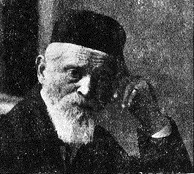Shmuel Shraga Feigenzen
Shmuel Shraga (Feibush) Feigenzen was born in Vilkomir in 1836 and died in Vilna in 1932. His penname was Shafan the writer. He was a publisher and writer who managed the Rom printing house in Vilna for many years. The printing house was better known as The Printing and Publication House of the Rom family.
He was born in Vilkomir in Lithuania (Russia) and, from an early age learned the printing trade. At the age of 24 he supervised the printing of the Shas and Mishnayot at the Shtetin printing press in Prussia.
In 1867 he was appointed manager of the Rom family printing business, a position he held for 55 years, except for a short break in 1888. In 1871, while preparing to print the Shulhan Aruch at the Rom publishing house, Feigenzen confessed to bribing the Christian convert Yaakov Brofman; he was the chief government censor and he agreed to allow Feigenzen to print a clause from The Breastplate of Justice which had been printed by other publishing houses, which stated that "it was permissible to kill an informer even at this time". It was sufficient for Feigenzen to add the footnote that this halacha was only valid at the time that the Shulhan Aruch was compiled and not at the time of printing of this edition in Vilna. Brofmnan's successor rejected the proposal during the Rom's second printing of the Shulhan Aruch in 1875 and demanded that the version be changed in the book to "it used to be permissible to kill the informer".
Feigenzen worked hard editing and typesetting the edition of the Talmud Bavli, which later became known as the Vilna Shas and became the basis for all subsequent printings of the Talmud Bavli. His efforts at this amazing project are described in Aharit Hayamim which appears in the last volume of the Talmud.
He was also responsible for the printing of the Rom's Talmud Yerushalmi and even wrote a commentary for it entitled Ruah Zekenim, which became famous for promoting the Talmud Yerushalmi. He was also the force behind the other publications of the Vilna printing press including basic Jewish textbooks which, at the time, were very highly respected.
During World War One, under the German occupation, it was not possible to continue the printing business, nevertheless Feigenzen and a handful of workers continued typesetting new books; as soon as it was possible to start printing again, they did so and revived the business. After the war, he handled the sale of the printing press and publishing house from Baron David Ginsburg's widow, who had owned the business since the death of the widow Rom, to Haim Cohen and his son Bendet (who died in 1953). Subsequently he was the owner of Yalkut publishing house that merged with Am Oved after his death. After his retirement he began editing his treatise Elbona shel Torah in which he points out mistakes, as well as intentional errors in the religious literature that were made by censors and Christian printers. In 1922, at the age of 85, he retired. He lived to the age of 96 and was buried in the Jewish cemetery in Vilna.
source: Wikipedia


